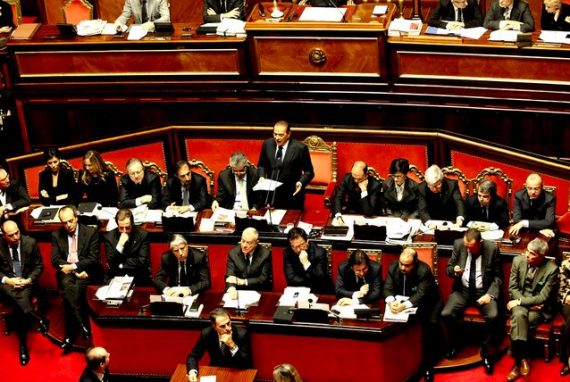Austerity Package Passes Italian Senate; Stage Set for New PM
Interesting and significant goings on in Italian politics.
 Via the BBC: Italy crisis: Senate adopts austerity law
Via the BBC: Italy crisis: Senate adopts austerity law
The package is expected to get final approval in a vote by the lower house at the weekend, paving the way for PM Silvio Berlusconi to resign.
[…]
The senate voted by 156 to 12 in favour of the austerity package. The bill now goes to the lower house, the chamber of deputies, which will meet in special session at the weekend.
[…]
The austerity package foresees 59.8bn euros in savings from a mixture of spending cuts and tax rises, with the aim of balancing the budget by 2014. Measures include:
- An increase in VAT, from 20% to 21%
- A freeze on public-sector salaries until 2014
- The retirement age for women in the private sector will gradually rise, from 60 in 2014 until it reaches 65 in 2026, the same age as for men
- Measures to fight tax evasion will be strengthened, including a limit of 2,500 euros on cash transactions
- There will be a special tax on the energy sector
The pending legislation and change at the top of the Italian government has made the markets happy (at least for the moment). Via the MarketWatch: Italy’s Senate backs budget bill, lifts markets.
The next move is for Berlusconi to resign and for a new government to be formed, which raises a rather interesting scenario.
Back to the BBC piece:
A technocrat government possibly led by former EU commissioner Mario Monti is being debated.
[…]
The Italian president has made Mr Monti a senator for life. He was welcomed into the chamber at the start of Friday’s session but then left for a meeting with President Napolitano.
The noteworthy thing about this move is that the the Italian President is chosen by the parliament, and therefore is not directly elected, and has a position that is largely ceremonial (as it typical for presidents in parliamentary systems). As such, it is a fairly dramatic situation (and arguably a case of a failure of the parties to adequately lead) that President Napolitano finds himself as actively involved as he is. This scenario as developing is one in which the appointed president will have appointed a non-elected individual to the Senate, who is turn appears likely be be selected by parliament to serve as PM. Alternatively, some have suggested he will be name finance minister.
For those interested in the constitutional parameters, Article 59 of the Italian constitution grants the president this power:
The president may appoint as senators for life five citizens who have brought honor to the nation through their exceptional accomplishments in the social, scientific, artistic, and literary fields.
The president also formally appoints the PM and the cabinet, but said government has to have the confidence of a majority of the parliament (meaning that the ultimate power of the the formation of the cabinet is in the hands of the members of parliament). At any rate, my initial reaction is that this a rather dramatic set of moves to, in a few days, elevate a non-elected citizen to the parliament and then to PM. At a minimum is quite interesting to anyone who pays attention to/studies comparative politics.
More on Monti:
A BBC profile: Profile: Mario Monti
The Globe and Mail: The possible faces of Italy’s new government.






“Austerity Package Passes Italian Senate; Stage Set for Rioting”
Fixed that headline for you. We all know that rioting is soon to follow.
Prediction: Italy’s budget deficit will not decrease after austerity takes effect. It will either remain constant despite spending cuts and tax hikes, or will increase. Italy’s economy will also slow or fall into recession by the end of the first quarter 2012.
@Ben Wolf:
This. Italy’s economy has been sluggish for years, and with things being as skittish as they are now, no mo’ money to keep things flowing.
The day of reckoning for the Eurozone are nigh. Austerity is just a measure by bankers and traders to keep the con going by kicking the can down the road and give time for aristocrats to invest elsewhere. A “Euro 1” and “Euro 2” would be even more can kicking. France and Spain are next, then the UK, then…
Austerity will work though. Always has, especially in large first world democratic economies. And remember, Keynesian economics are a lie, because the United States economy totally and utterly failed after skittish investors and bond vigilantees and wealthy bankers fled the nation after the Japanese destroyed Pearl Harbor in 1941.
@Lit3Bolt: You can’t suck money out of the private sector without forcing it to contract. And yet our supposed realist conservatives can’t seem to get their heads around that fact.